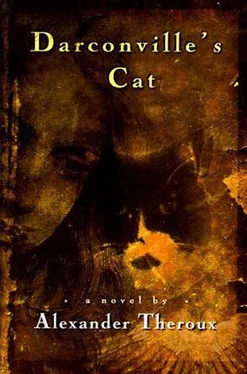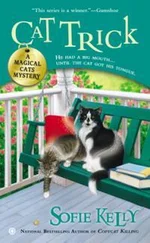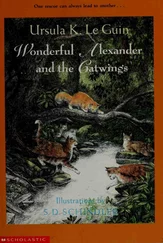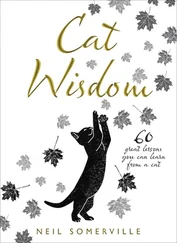The horizontal sun, shooting its rays through great dark banks of western clouds, sent a last coppery glow under the shade, the fiery reflection of what was left of a good day. Dareonville closed his eyes, strained from concentration, and leaned back. With a furtive movement of his shoulders, he turned, feeling suddenly a girl’s phantom presence in the room. But he ignored it and continued working on into the night, his face a shadow above the gooseneck lamp — the cat snoring — rewriting the pages he’d spent the day on. It was abundance, to be alone, in the solitude of night, watching what you fashioned and fashioning by the miracle of art what was nothing less than giving birth by parthenogenesis. At last, in the middle of the close and quiet night, he saw he was done. He looked up at the old watch hanging on the nail: late, late — the tortoise of the hour hand, the hare of the minute hand epiphanizing the ambivalence of time that both weighed on him and bore him up. But then there on the desk, completed, lay the finished pages, washed with silver, wiped with gold. And the phantom?
The light was out, and he was fast asleep, happier than anyone deserved to be, and the only phantoms he could see were the benevolent ones he found in the fleeting fancies of his dreams. And that was fine with him. Accident he would leave to life which specialized in it.
The unthrift sun shot vital gold, a thousand pieces.
— HENRY VAUGHAN, Silex Scintillons
THE CLASSROOM was old. It seemed in dark and incongruous contrast to the delicate femininity it both isolated and yet protected with a fastness like that of some battlemented watchtower. On the wall hung a portrait of the Droeshout Shakespeare and a canvas map of Britain, pocked with red pins. This was English 100, a freshman section of girls who were almost all dressed à la négligence in the present-day fribble-frabble of fashion, mostly jeans and wee pannikins.
Darconville strode in and sat down. He placed his books on the desk, and, as he smiled, the girls straightened around to squeaks, the click of shoes, the scent of earth-flowers. The moment was immediately memorable, for instantly aware at the corner of his eye of a sparkle, the fluorescence, of a jewel, he looked up with sudden confusion, as if bewildered to discover art in nature’s province. It was she: a faery’s child, the nameless lady of the meads, full beautiful, sitting in the front-row seat at the far right with her eyes lowered to the desk in a kind of fragrant prayer, her chin resting gently on the snowy jabot of her blouse and her hair, tenting her face, golden as the Laconian’s. Prepared for her, he saw he really wasn’t. The heart in painful riot omitted roll-call.
“Shall we look at the Keats?” asked Darconville, quietly. It had been their first assignment: to analyze one poem. There was a marked self-consciousness in the straightening of shoulders, in the coughs, as the students settled down resolutely to consider the poem.
“As one must pronounce a Chinese ideograph in order to understand it,” said Darconville, “so also must a poem be read aloud. Would anybody care to do so?” He waited.
Silence.
“Anyone?”
The girls remained earnestly hunched over their books, submissive to the idea that obscurity can be found in the solemnity of well-aimed concentration.
“Anyone at all?”
The linoleum snapped.
Darconville was amused. It seemed like vesper hour at the Shaker Rest Home for Invalid Ladies. The discomfort was palpable, with not an eye on him. Then a hand shot up.
“Miss—” Darconville looked at his roll-book.
“Windt,” the student provided.
It was a girl in the third row who resembled Copernicus, the shape of her pageboy, its two guiches coming forward like tongs and swinging at the jawline, making her look small as a creepystool. She turned to one of her girlfriends for confidence, then stood up, and began.
”Bright star! would I were steadfast as thou art—
Not in lone splendor hung aloft the night,
And watching, with eternal lids apart,
Like Nature’s patient, sleepless, um —”
“Eremite,” said Darconville. “Hermit.”
Rachel Windt, wrinkling her nose, squinted at the word. Darconville, repeating the word, prodded her.
“E-eree-ereem—”
“Just pronounce the consonants,” Darconville said, laughing, trying to relax her, “and the vowels will fall into place.” Two girls in the back row exchanged cold glances; they didn’t find that particularly funny. Rachel Windt bewilderedly twisted up a noil of her hair, shrugged, and continued.
”The moving waters at their priestlike task
Of pure, um , ablution round earth’s human shores,
Or gazing on the new soft fallen mask
Of snow upon the mountains and the moors—”
“Perfect. Let’s stop there,” said Darconville, “where the octave and sestet hinge. This is a sonnet — composed, if you’ll notice, in one sentence — in which the poet expresses a wish. And what, let’s ask ourselves, is that wish?” He paused. “Anybody?”
“He’s wishin’ he was a star?”
Wishin’ . Your thlipsis is showing, thought Darconville, looking in the direction of the voice.
It was a long-nosed piece of presumption in the last row, wearing an armory of Scandinavian nail-jewelry, who was less concerned with a Romantic poet’s tragic wishes than after-shampoo flyaways if the comb she simultaneously shuttled through her hair to the repetitious snaps of chewing gum meant anything. Darconville smiled and kindly suggested that she was, even if a trifle so, somewhat wide of the mark. Snap. Another hand? Anyone?
“Miss?”
This voice came from the direction of — but it was not hers. Darconville, with no small difficulty, fixedly tried to keep his eyes focused on this student alone, a moon radiant only for the proximity of that adjacent sun whose beauty, even in a condition of reflected light, seemed startling enough to destroy his sight on the instant.
“Trinley Moss,” answered the girl, standing up, her six bracelets jangling, in an opera blue turtleneck sweater and plaid wrap-around, safety-pinned at the thigh. “Well, I believe he’s right unhappy,” she said, “and that this star he mentions, symbolizin’ brightness, is drivin’ this poor child here, I don’t know, to wishin’ he could either touch it or, I don’t know, just plain ol’ flop down and become a”—she shrugged—’’a eremite?”
Darconville began to feel like St. Paul, watching errors creep in at Colossae. It wasn’t all that bad, hardly a matter for despair. He took teaching to be a mission, not a trade, and sought to avoid the by-the-numbers Drillschule technique that, for one reason or another, had apparently long been held in vogue there by various pompous doodles and burgraves-of-fine-print on the Quinsy faculty, teachers, for whom students were the little limbs of Satan, who bored the girls to distraction repeating opinions seamed by cankerworm and reading from lecture notes long since parched by the Dog Star. He would be patient. At Quinsy it was an essential requirement, for although the state constitution laid claim to its being a school of higher learning, he from the very first day of arrival wondered just what level they were measuring from, and if they took salt tablets when doing so.
Darconville ranged the room with his eyes for a better answer— they couldn’t as yet settle on la femme d’intérieur —and noticed a girl, her pencil poised above her notebook, a response in her eyes, an answer on her lips. He nodded to her.
“I am Shelby Uprightly,” she said, neatly pressing her glasses to her zygomatic arch with one finger. “John Keats in his sonnet, ‘Bright Star,’ wishing to be steadfast, as he states, but not alone, is quite painfully expressing, as he often did, the particular tension of feeling he suffered when torn between a desire for the Ideal, the lovely star, in this case, and the Real, the girl mentioned in the last lines, someone he must have—”
Читать дальше












